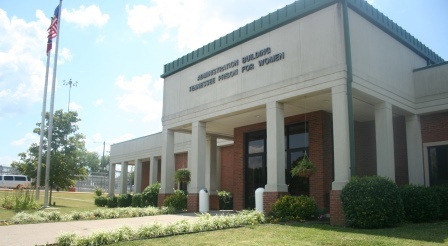
Tennessee law allows judges to send people charged with crimes to a state prison — in solitary confinement — while they’re waiting for a trial. Sometimes it’s because they were deemed violent, but they can also be put away because they have a medical or mental health issue that the county jail can’t accommodate.
A recent investigation by
the Tennessean and the Marshall Project found the result of this so-called “safekeeping” law is dozens of people who are kept in solitary confinement for months or even years. Lead reporter Allen Arthur spoke to WPLN’s Jason Moon Wilkins about how Tennessee’s law compares to other states.
What exactly are “safekeeping” laws?
“If a local jail is insufficient for the care of someone while they wait for trial — so they haven’t been convicted of anything yet, they’re not a Department of Corrections inmate yet — … the law says they can be sent to the nearest sufficient jail.
“In other states that have these safekeeping laws, the state will take the person in, give them treatment that the county doesn’t have access to, and send them back frequently because the county is still paying for everything. Tennessee is unique because a county applies for safekeeping through the state…and the state of Tennessee pays for it. So what happens is the counties never or very infrequently get them back and they sit in Tennessee Prison for Women or Riverbend Max [Security Prison] or DeBerry [Special Needs Facility] for, in most cases, months — and, in several cases, years — waiting for their trial.
How does Tennessee compare to other states who still use this?
“For example, in South Carolina, their safekeeping law is such that there can be a maximum of 10 safekeepers at a time, and the governor actually has to sign off on each one. So it’s a much more rigid process. North Carolina, for example, they have a wing of one of their prisons that’s devoted solely to safekeepers and they cap how many safekeepers they can have at a time. So, if they meet their cap or a county meets their cap, they say, ‘Well, you have to take somebody back first.'”
One
of the people you profiled was a 16-year-old girl from Memphis who, just in the last couple of weeks, a judge decided that she should not be in solitary anymore, she should be sent back to the local county jail. He said he essentially had two poor choices: a local county jail that didn’t have a way to separate her from adult inmates and solitary confinement. He wasn’t really happy with either choice. What other choice should there be?
“I think setting up some kind of system where these people can be monitored on the state level, because the state says it’s the county’s problem — they’re not really Department of Corrections inmates. So putting in someone in the state who could be a liaison for these people…giving them access to more mental health care.
“And they are classified in Department of Corrections documents as ‘administrative segregation.’ It’s mandatory. Creating a system where that’s a bit more flexible and they are not all automatically put into isolation. Maybe some of them can be in general population. Those are all options that could be on the table.
“
Are there any concerns about unintended consequences? Some have said, ‘Well, you might be taking away a tool for the courts to use.'”
“I’m totally understanding of counties needing to get help. I talked to sheriffs and jail administrators who said, ‘This person may have advanced cancer, or this person may have dialysis. We just can’t get them that care here.’ I don’t want to say that every single instance of safekeeping is illegitimate.
“I think refining the system so that there’s some sort of structure in place to monitor them, to ensure that they get back if their condition improves…There needs to be some kind of system in place where they aren’t stuck anymore.”


